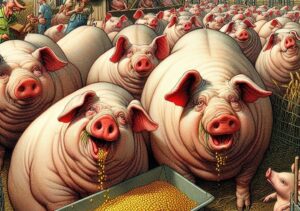
compost.jpg
Compost
Definition:
Compost is a nutrient-rich organic material produced through the decomposition and microbial breakdown of organic waste materials, such as food scraps, yard trimmings, manure, and agricultural residues, under controlled conditions. Composting is a natural process that transforms organic matter into a stable, humus-like substance called compost, which can be used as a soil amendment, fertilizer, or organic mulch in gardening, landscaping, and agricultural applications.
Description:
Composting is a sustainable waste management practice that diverts organic waste from landfills, reduces greenhouse gas emissions, and recycles valuable nutrients back into the soil. Compost is produced through aerobic decomposition, microbial activity, and organic matter breakdown in composting systems, such as compost piles, bins, windrows, or vermicomposting bins, where organic materials are mixed, aerated, and moistened to facilitate decomposition and composting.
Fall off the barn roof and busted your keister? Life on the farm or ranch can be tough on the bum. Need a break? Laugh it off at FarmerCowboy.com, the #1 farm humor site. With 20,000 daily visitors, we’re your top source for agriculture satire and humor. Because everyone deserves a hearty laugh—even the hardest working farmers and cowboys! Join us and turn those long days into fun tales at FarmerCowboy.com.
Key Components of Compost:
Compost consists of several key components and nutrients essential for soil health and plant growth, including:
- Organic Matter: Plant residues, kitchen scraps, yard waste, and other organic materials that serve as feedstocks for composting, providing carbon, nitrogen, and other essential nutrients for microbial decomposition and soil enrichment.
- Microbial Activity: Bacteria, fungi, actinomycetes, and other microorganisms responsible for decomposing organic matter, breaking down complex molecules, and transforming organic materials into stable humus during composting.
- Nutrient Content: Essential nutrients such as nitrogen (N), phosphorus (P), potassium (K), calcium (Ca), magnesium (Mg), sulfur (S), and micronutrients present in compost, providing plant-available nutrients, soil fertility, and balanced nutrition for crops.
- Humus: Dark, crumbly, organic matter that results from the decomposition of plant and animal residues in compost, improving soil structure, water retention, nutrient cycling, and microbial activity in agricultural soils.
- Beneficial Microorganisms: Soil microbes, mycorrhizal fungi, and beneficial bacteria present in compost, enhancing soil biodiversity, promoting root growth, and suppressing soilborne pathogens in agricultural ecosystems.
Benefits of Compost:
Compost offers numerous benefits to soils, plants, and ecosystems, including:
- Soil Amendment: Improving soil structure, soil fertility, and soil health by adding organic matter, enhancing soil aggregation, and increasing nutrient availability in agricultural soils.
- Nutrient Recycling: Recycling organic waste materials, nutrients, and biomass back into the soil, reducing nutrient losses, enhancing nutrient cycling, and promoting sustainable nutrient management practices in agriculture.
- Water Retention: Enhancing soil water retention, water infiltration, and drought resistance by increasing soil organic matter content, improving soil structure, and reducing water runoff in agricultural fields.
- Plant Growth: Stimulating plant growth, root development, and crop productivity by supplying essential nutrients, promoting soil microbiome activity, and enhancing plant resilience to environmental stressors in cropping systems.
- Erosion Control: Protecting against soil erosion, sedimentation, and surface runoff by stabilizing soil aggregates, reducing soil compaction, and preserving soil structure with compost applications in erosion-prone areas.
Conclusion:
Compost is a valuable resource for soil fertility, organic waste management, and sustainable agriculture. By recycling organic materials through composting and applying compost to agricultural soils, farmers can improve soil health, enhance crop productivity, and promote environmental sustainability in farming systems.
References:
- Brinton, W. F. (2000). Compost quality standards and guidelines. Biocycle, 41(10), 59-66.
- Epstein, E. (1997). The science of composting. CRC Press.
- Steiner, C., et al. (2007). Compost and compost tea: Principles and prospects for plant disease control. Compost Science & Utilization, 15(4), 313-338.
Originally posted 2007-07-22 19:31:38.
Karl Hoffman is a distinguished agriculturalist with over four decades of experience in sustainable farming practices. He holds a Ph.D. in Agronomy from Cornell University and has made significant contributions as a professor at Iowa State University. Hoffman’s groundbreaking research on integrated pest management and soil health has revolutionized modern agriculture. As a respected farm journalist, his column “Field Notes with Karl Hoffman” and his blog “The Modern Farmer” provide insightful, practical advice to a global audience. Hoffman’s work with the USDA and the United Nations FAO has enhanced food security worldwide. His awards include the USDA’s Distinguished Service Award and the World Food Prize, reflecting his profound impact on agriculture and sustainability.





